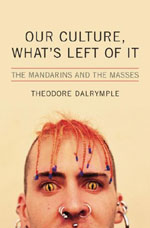Our Culture, What's Left of It
 |
|
| Author | Theodore Dalrymple |
|---|---|
| Country | United States |
| Language | English |
| Subject | Social criticism |
| Published | 25 May 2005 Ivan R. Dee |
| ISBN | |
Our Culture, What's Left of It: The Mandarins and the Masses is a 2005 non-fiction book by British physician and writer Theodore Dalrymple. It is composed of twenty-six separate pieces that cover a wide range of topics from drug legalisation to the influence of Shakespeare. A common theme is criticism of modern society in Great Britain and, in many articles, social attitudes towards literature. The book was published by the Ivan R. Dee group. He generally describes British culture as a "moral swamp" and writes that the people must return to past traditions before it is too late.
As a common theme, Dalrymple depicts what he sees as "the moral swamp that is contemporary Britain". He criticises current British national culture as "a banal, self-pitying, witless and shallow emotional incontinence". He advocates a restoration of what he calls traditional British virtues such as "prudence, thrift, industry, honesty, moderation, politeness, self-restraint".
In the essay "Who Killed Childhood?", he writes that modern British children now grow up in a warped environment that gives them an "egotistical inability to feel, compensated for by an outward show." He states that on one end the social culture tends to treat children as small adults. While at the same time, he argues that an extended adolescence prevents young adults from maturing much further from that initial jump made as children. He blames a breakdown of the traditional family and widespread illegitimacy, and he states that for many people parenting is just one immature person blindly enforcing their will upon another immature person.
In another essay, he discusses the immense power of music over humanity. He describes how various dictators from Vladimir Lenin to the Ayatollah Khomeini have opposed the public's right to play their music, and thus how music inherently challenges totalitarian thinking since it defies ideological characterisation. He writes about how the idea that what cannot be scientifically measured does not truly exist fails.
He condemns the secularisation of British society, writing:
...
Wikipedia
